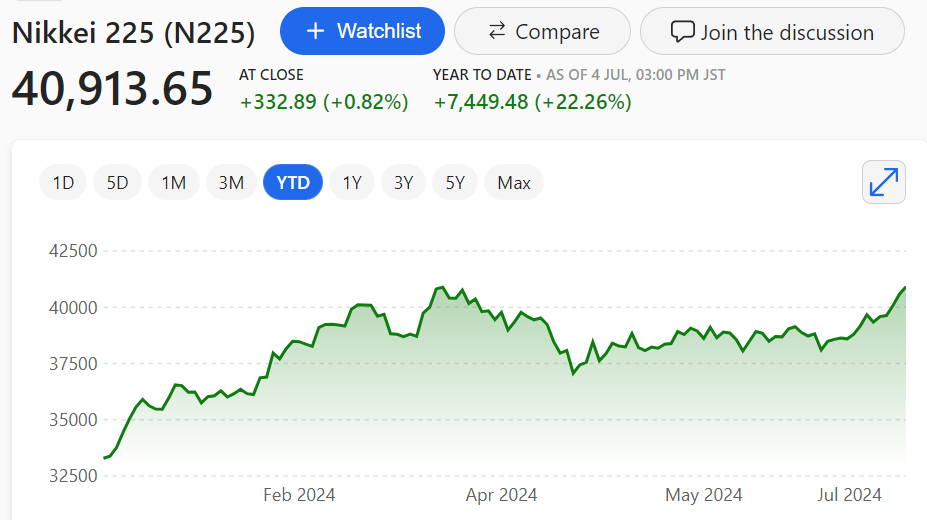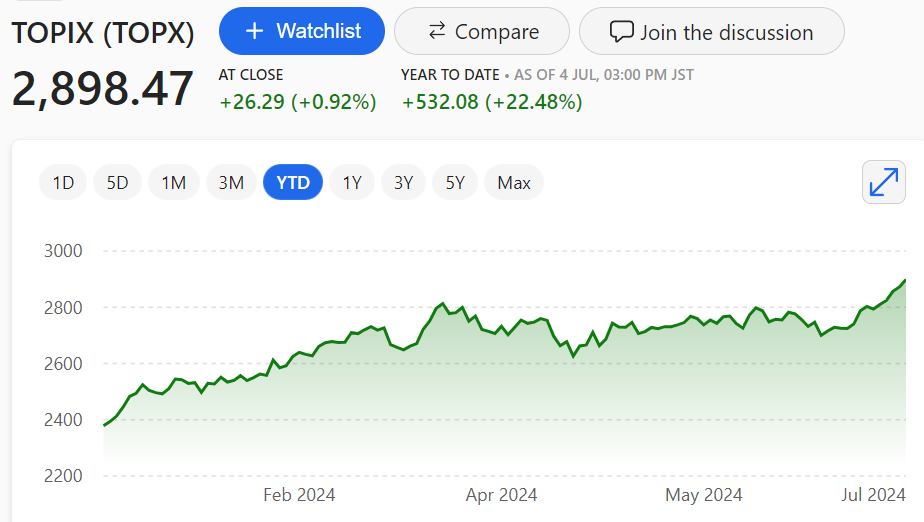Japanese Stock Market Continues Soaring, Topix and Nikkei 225 Both Hit New Highs
The Nikkei 225 index rose 0.82% on Thursday and closed at a historic high of 40,913.65 points. Meanwhile, the Topix index closed up 0.9% on Thursday at 2,898.47 points, exceeding the historical high set in December 1989.
On Thursday's close, Japan's Topix index and Nikkei 225 index both closed higher.
Among them, boosted by a large number of purchases in technology and export-oriented stocks, the Nikkei 225 index rose 0.82% on Thursday and closed at a historic high of 40,913.65 points, breaking the record of 40888.43 points set on March 22 this year.

In addition, the Topix index closed up 0.9% on Thursday, reaching 2,898.47 points, exceeding the historical high set in December 1989. The Topix index covers over 2000 Japanese companies, with almost all 33 industry sub indices rising.

In the Japanese stock market, the best performing industries are stocks of automobile manufacturers and semiconductor companies. In addition, stocks of insurance companies and banks have also performed well, as the market expects the Bank of Japan to raise interest rates, which will increase the profitability of these financial stocks.
Hideyuki Ishiguro, Chief Strategist at Nomura Asset Management, said, "Unlike the Nikkei 225 index, which leans towards certain stocks, the trend of the Topix index indicates that the entire Japanese market is bottoming out and rebounding, reaching a historic high." He added that Japan is emerging from deflation and its valuation is still relatively low compared to the United States.
Since the beginning of this year, the Nikkei 225 index has risen by 22.26%, while the Topix index has risen by 22.48%.
The continuous rise of Japanese stock market this year reminds us of Japan's foam economy. In the late 1980s, asset prices in Japan soared during the foam economy, and the Nikkei 225 index also soared. But in early 1990, with the bursting of the foam, the Nikkei 225 index collapsed after hitting a historical high of 38,915.87.
Part of the reason why investors are flocking to the Japanese market is due to the weak yen exchange rate. Recently, the exchange rate between the US dollar and the Japanese yen has been hovering around a 34 year low of 161.
In addition, global funds have also flooded into the Japanese stock market, which has been affected by high profits from companies and the Tokyo Stock Exchange's push to improve corporate governance.
Bank of America's fund manager survey in June showed that the Japanese stock market remains the most popular market in Asia. Among them, one-third of the respondents stated that their focus is on improving corporate governance. Analysts predict that the latest reform plan for the Tokyo Stock Exchange's Tokyo Composite Index will further put pressure on companies to improve their governance.
Goldman Sachs strategist Bruce Kirk wrote in a report, "Japanese companies are still very keen to show that they are responding to the pressure of corporate governance reform on the Tokyo Stock Exchange."
·Original
Disclaimer: The views in this article are from the original Creator and do not represent the views or position of Hawk Insight. The content of the article is for reference, communication and learning only, and does not constitute investment advice. If it involves copyright issues, please contact us for deletion.